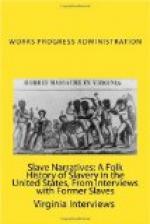“I was born in Frederick County, Maryland, 84 years ago or 1853. My father’s name was Henry and mother’s Jane; brothers Dave, Joe, Henry, John and sisters Annie and Josephine. I know my father and mother were slaves, but I do not recall to whom they belonged. I remember my grandparents.
“My father used to tell me how he would hide in the hay stacks at night, because he was whipped and treated badly by his master who was rough and hard-boiled on his slaves. Many a time the owner of the slaves and farm would come to the cabins late at night to catch the slaves in their dingy little hovels, which were constructed in cabin fashion and of stone and logs with their typical windows and rooms of one room up and one down with a window in each, the fireplaces built to heat and cook for occupants.
“The farm was like all other farms in Frederick County, raising grain, such as corn, wheat and fruit and on which work was seasonable, depending upon the weather, some seasons producing more and some less. When the season was good for the crop and crops plentiful, we had a little money as the plantation owner gave us some to spend.
“When hunting came, especially in the fall and winter, the weather was cold, I have often heard say father speak of rabbit, opossum and coon hunting and his dogs. You know in Frederick County there are plenty of woods, streams and places to hunt, giving homes and hiding places for such game.
“We dressed to meet the weather condition and wore shoes to suit rough traveling through woods and up and down the hills of the country.
“In my boyhood days, my father never spoke much of my master, only in the term I have expressed before, or the children, church, the poor white people in the neighborhood or the farm, their mode of living, social condition. I will say this in conclusion, the white people of Frederick County as a whole were kind towards the colored people and are today, very little race friction one way or the other.”
Ellen B. Warfield May 18, 1937
Alice Lewis.
(Alice Lewis, ex-slave, 84, years old, in charge of sewing-room at Provident Hospital (Negro), Baltimore. Tall, slender, erect, her head crowned by abundant snow white wool, with a fine carriage and an air of poise mud self respect good to behold, Alice belies her 84 years.)
“Yes’m, I was born in slavery, I don’t look it, but I was! Way down in Wilkes County, Georgia, nigh to a little town named Washington which ain’t so far from Augusta. My pappy, he belong to the Alexanders, and my mammy, she belong to the Wakefiel’ plantation and we all live with the Wakefiel’s. No ma’am, none of the Wakefiel’ niggers ever run away. They was too well off! They knew who they friends was! My white folkses was good to their niggers! Them was the days when we had good food and it didn’t cost nothing—chickens and hogs and garden truck. Saturdays was the day we got our ’lowance for the week, and lemme tell you, they didn’t stint us none. The best in the land was what we had, jest what the white folkses had.




